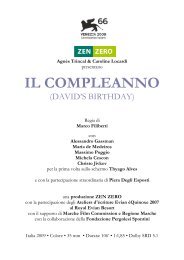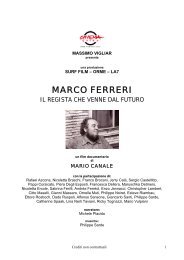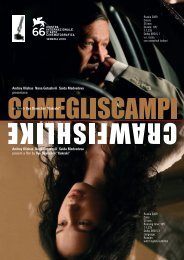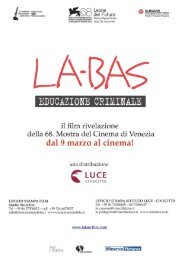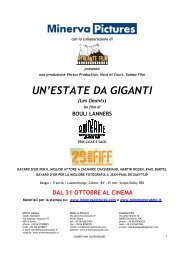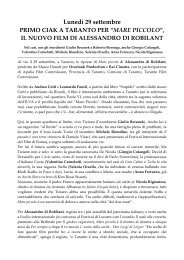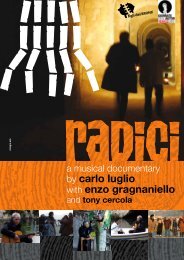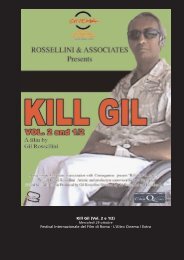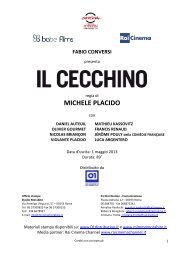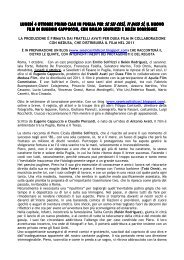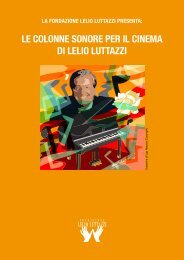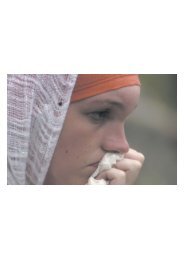MARCO FERRERI - mimmomorabito.it
MARCO FERRERI - mimmomorabito.it
MARCO FERRERI - mimmomorabito.it
You also want an ePaper? Increase the reach of your titles
YUMPU automatically turns print PDFs into web optimized ePapers that Google loves.
MASSIMO VIGLIAR<br />
presents<br />
a production<br />
SURF FILM – ORME – LA7<br />
<strong>MARCO</strong> <strong>FERRERI</strong><br />
The director who came from the future<br />
a documentary film<br />
by<br />
MARIO CANALE<br />
W<strong>it</strong>h the participation of:<br />
Rafael Azcona, Nicoletta Braschi, Franco Brocani, Jerry Calà, Sergio Castell<strong>it</strong>to,<br />
Pappi Corsicato, Piera Degli Esposti, Francesca Dellera, Maruschka Detmers,<br />
Nicoletta Ercole, Sabrina Ferilli, Andréa Ferréol, Enzo Jannacci, Christopher Lambert,<br />
C<strong>it</strong>to Maselli, Gianni Massaro, Ornella Muti, Philippe Noiret, Esteve Riambau,<br />
Ettore Rosboch, Dado Ruspoli, Alfonso Sansone, Giancarlo Santi, Philippe Sarde,<br />
Catherine Spaak, Lina Nerli Taviani, Ricky Tognazzi, Mario Vulpiani<br />
narrator:<br />
Michele Placido<br />
Music:<br />
Philippe Sarde<br />
Non contractual cred<strong>it</strong>s
TECHNICAL DATA<br />
Marco Ferreri, the director who came from the future<br />
ITALIA 2007, b/w and colour, 90’<br />
Direction: Mario Canale<br />
Story and screenplay: Mario Canale, Annarosa Morri<br />
Narrator: Michele Placido<br />
Music: Philippe Sarde<br />
Ed<strong>it</strong>ing: Adalberto Gianuario, Alessandro Raso<br />
Photography: Maurizio Carta, Massimo Coconi, Paolo Mancini, Marcello Rapezzi,<br />
Mario Canale<br />
Iconography research: Rosellina d’Errico<br />
Executive production: Mario Canale, Elena Francot<br />
Archive images:<br />
Orme<br />
Ist<strong>it</strong>uto Luce<br />
Aamod – Archivio Audiovisivo del Movimento Operaio e Democratico<br />
Fondazione Mario Schifano<br />
TVE – A fondo - 1978<br />
Argento puro di Pappi Corsicato<br />
Giancarlo Santi : facevo er Cinema di Anton Giulio Mancino<br />
Italia Taglia di Tatti Sanguineti<br />
Antonioni di Gianfranco Mingozzi<br />
Period pictures :<br />
Jacqueline Ferreri<br />
Reporters Associati<br />
Images of the film for kind concession of:<br />
Jacqueline Ferreri<br />
Surf film: Controsesso, La donna scimmia, La Carne, Diario di un vizio, L’uomo dei 5<br />
palloni, Casanova 70, Il fischio al naso, Cronaca di un amore.<br />
Myra Film : La Grande abbuffata, Non toccare la donna bianca, Ciao Maschio, Il seme<br />
dell’uomo, El Cochec<strong>it</strong>o, La casa del sorriso, N<strong>it</strong>rato d’argento.<br />
Champions Film: Break Up.<br />
Ist<strong>it</strong>uto Luce: L’Udienza.<br />
Gianni Massaro: Dillinger è Morto, La Cagna.<br />
Special thanks:<br />
Monica Schifano<br />
Luca Ronchi<br />
And the patient Cléo<br />
Ufficio Stampa<br />
Studio Morab<strong>it</strong>o<br />
Telefono: 06 57300825 / Mobile: 334 6678927 / Fax 06 57300155<br />
info@<strong>mimmomorab<strong>it</strong>o</strong>.<strong>it</strong>; www.<strong>mimmomorab<strong>it</strong>o</strong>.<strong>it</strong><br />
Non contractual cred<strong>it</strong>s
<strong>MARCO</strong> <strong>FERRERI</strong>, THE DIRECTOR WHO CAME FROM<br />
THE FUTURE<br />
synopsis<br />
____________________________________________________________________________________<br />
“The method used in cinema production is anarchy: I hope that this will continue for a b<strong>it</strong>;<br />
that <strong>it</strong> will be possible to continue to do some anarchy w<strong>it</strong>h cinema”. W<strong>it</strong>h this quote by<br />
Marco Ferreri, taken from an interview w<strong>it</strong>h the great director, starts the film documentary<br />
by Mario Canale who, ten years from his death wants to recuperate the memory of this<br />
filmmaker who was forgotten too soon, and of his extraordinary and magnificent talent.<br />
From that famous 9 th of March many things have changed: but in his prophetic vision he<br />
would already see future sceneries and would suggest – in the only way in which an artist<br />
can- through his own opera – that of the world we are living in, and the one that we will<br />
soon be living.<br />
Did Marco Ferreri know he was able to catch in the presents, signs of the future?<br />
In 1988, for the release of “Come sono buoni i bianchi” (Oh how good are the wh<strong>it</strong>es),<br />
he confirmed how in Africa he caught, during the shootings, the signs of the birth of a new<br />
religious fundamentalism, that would not have delayed to manifest <strong>it</strong>s dramatic<br />
consequences.<br />
However, <strong>it</strong> is the entire filmography of Marco Ferreri that tells us our present, even w<strong>it</strong>h<br />
the t<strong>it</strong>les furthest from our time: “Non toccare la donna bianca” (Don’t touch the wh<strong>it</strong>e<br />
woman), 1974, talks to us about the Banlieux revolt; “Dillinger è morto” (Dillinger is<br />
dead), 1968, anticipates the ordinariness of modern times crime; “La casa del sorriso ”<br />
(The home of a smile), 1991, reflects on w<strong>it</strong>hdrawal of old age. And “N<strong>it</strong>rato d’Argento”,<br />
his goodbye to cinema, is the requiem for the theatre, subst<strong>it</strong>uted in enjoying forms which<br />
always result new.<br />
Sulphuric, scandalous, scratching and iconic: Marco Ferreri has been this, and much<br />
more. Nevertheless his black humour, his anarchic look, the misogyny, and the tags that<br />
accompanied him, hide the real red thread of his operas; the prevision, that in anticipation<br />
to the times slightly shows between the lines of today, the sceneries of tomorrow.<br />
And <strong>it</strong> is to this removed aspect of Marco Ferreri’s cinema that “Il regista che venne dal<br />
futuro” is dedicated: a documentary which goes together w<strong>it</strong>h the anti-conformist<br />
character of a man who was extreme, provocative in his ways and serious in his operas,<br />
always at vanguard, visionary and experimental. 90 minutes that derive from authentic<br />
places and people, to then be able to conduct in the spaces of a fantastic reconstruction,<br />
an inquiry where the characters they have met, worked w<strong>it</strong>h or have been friends of the<br />
director, work, w<strong>it</strong>h many archival films both Italian and foreign, some which are absolutely<br />
ined<strong>it</strong>ed. The structure is made clear from some chapters in which Marco Ferreri gives us,<br />
in an abrupt, irreverent, and often over the lines, his lucid and disenchanted vision of the<br />
world.<br />
Non contractual cred<strong>it</strong>s
A special thanks goes to Michele Placido, who donated his voice and his face to the<br />
documentary; and to Jacqueline Ferreri, for the precious and loving support that rendered<br />
this film possible.<br />
Non contractual cred<strong>it</strong>s
<strong>MARCO</strong> <strong>FERRERI</strong>, THE DIRECTOR WHO CAME FROM<br />
THE FUTURE<br />
STORY OF A MEETING: director’s notes<br />
____________________________________________________________________________________<br />
The first time I met Marco Ferreri I was at the motion in Sala Platina, at the time of<br />
Gaumont. I was preparing the trailer of a film the he had helped create, “Amore Tossico”<br />
(Toxic Love) by Claudio Calligari, and when he came in, discussing w<strong>it</strong>h the protagonists.,<br />
he quickly looked at the mounted images: then mumbling he turned to me and said: “you<br />
didn’t understand anything about the film”. He turned and went away.<br />
I saw him a few years later in Paris on the set of “I love you”, I almost didn’t have the<br />
courage to speak to him, but straight away I realized I was in front of not only a great<br />
director but most of all I was in front of a man who hid behind his rude ways an<br />
extraordinary sensibil<strong>it</strong>y. Actually, towards the world of cinema that I had entered through<br />
the back door, and almost accidentally, I had had until that moment an att<strong>it</strong>ude of<br />
superior<strong>it</strong>y: I felt more” modern” ,and even if I had been on set for years, even the most<br />
prestigious ones, I didn’t feel so involved.<br />
That set, instead, in an old factory in Paris’ outskirts, that man w<strong>it</strong>h a beard and dwarf’s hat<br />
who was shouting orders and was walking eating mandarins or oranges, bew<strong>it</strong>ched me. It<br />
was love at first sight: I like everything, especially to hear him speak. I believe that through<br />
the years I have never felt a great pleasure and the fear to feel inadequate at the same<br />
time as on Marco Ferreri’s set.<br />
It was not easy to interview him, he often responded in mono syllables, and other times<br />
spoke of something else.<br />
Who does TV interview, is most of the times attached to the present: he has to bring<br />
something home, he has to “extort” from the interviewed those two minutes of history, of<br />
an explanation in order to conclude the interview. W<strong>it</strong>h Marco was different, he did not love<br />
to tell history, maybe he did not even love the journalist who took from him judgments or<br />
aphorisms about the universe, then being satisfied w<strong>it</strong>h some pungent jokes.<br />
I interviewed him about ten times overall on set or at festivals :at times I suffered a lot,<br />
other times I went around his set even when I didn’t work for a TV programme anymore,<br />
and even if I had to pay the troupe i did w<strong>it</strong>h great pleasure. I remember when he was<br />
directing “La casa del sorriso” in Cattolica and he called me to ask me to go there, and<br />
although I was refusing to go ( I didn’t work in the cinema industry in that period) he<br />
abruptly instead to come.<br />
In Cattolica, in that beautiful set adapted on the old marine colonies, he did not want to talk<br />
about the film: He had hired a publicist to do <strong>it</strong> for him, because he was convinced the<br />
journalist just wanted to hear a story from him, and wanted to talk about him w<strong>it</strong>hout<br />
worrying about the film. It was a surreal interview: almost one hour of half spoken words,<br />
whilst he yawned, bored, and I tried in every way to make him say something. It was a<br />
great life lesson, for which I will always be grateful to him, although I realised much later<br />
and I went back to Rome almost destroyed by frustration.<br />
Non contractual cred<strong>it</strong>s
For many years I have wanted to do a documentary on Marco, and three or four times I<br />
also thought of beginning to mount <strong>it</strong>: Twice I also gave <strong>it</strong> a t<strong>it</strong>le ,in others I put together<br />
some materials on him for festivals or TV shows. The first was supposed to be the pilot of<br />
a series w<strong>it</strong>h a presumptuous t<strong>it</strong>le: “Director’s tw<strong>it</strong>ches”, and <strong>it</strong> is still somewhere.<br />
Sometimes I participated on the backstage of some festivals and as an example of my<br />
work I presented rolling on Ferreri’s sets: in no other case has <strong>it</strong> ever happened to me to<br />
feel so close to what for me represented cinema.<br />
The last time I met him <strong>it</strong> was by mistake in 1996, in Paris, in Saint Germain. I was filming<br />
for Rai TV and he was coming back from a vis<strong>it</strong> to Marcello Mastroianni, who was sick.<br />
Both of us in a hurry: he gave me his number. Later on I lost many things on my way, and I<br />
will never forgive myself for this.<br />
Regarding “Marco Ferreri: the director who came from the future”, I first of all have to thank<br />
Jaqueline Ferreri who was Marco’s wife and companion, but also his accomplice in his<br />
cinematographic adventures, and later on she was the careful observer of his moral<br />
hered<strong>it</strong>y. Annarosa Morri, who helped me and collaborated w<strong>it</strong>h me. Nicoletta Ercole, the<br />
first collaborator, and my friend, and finally a loving guardian of Marco’s memory. Luca<br />
Ronchi and his valuable advises and suggestions. Elena Francot and Massimo Vigliar<br />
from Surf Film. Furthermore, a thanks to Alfredo Moroni of La7, who believed in this<br />
project and w<strong>it</strong>hout whom this documentary would not have been realised.<br />
And finally to all of who participated, and those who have loved Ferreri and his cinema.<br />
Mario Canale<br />
Non contractual cred<strong>it</strong>s
<strong>MARCO</strong> <strong>FERRERI</strong>, THE DIRECTOR WHO CAME FROM<br />
THE FUTURE<br />
<strong>MARCO</strong>’S STORY: biography of Marco Ferreri<br />
Born in Milan, the 11 th May 1928, after some public<strong>it</strong>y short film he went to live in Rome,<br />
dedicating himself to production. It is the beginning of the 50s, and his first t<strong>it</strong>le,<br />
Documento Mensile and Amore in c<strong>it</strong>tà , brought him in contact w<strong>it</strong>h Cesare Zavattini, and<br />
later on w<strong>it</strong>h Alberto Lattuada (Il cappotto), who will always want him in La Spiaggia and,<br />
later on, in Mafioso.<br />
After living in Rome, where he was not particularly successful, <strong>it</strong> was his old job, a<br />
tradesman, to bring him to Spain, where he met Rafael Azcona. This meeting gave life to<br />
one of the most influential and lasting partnership in European Cinema’s history. Following<br />
El pis<strong>it</strong>o and Los chicos, <strong>it</strong> was the third work El cochec<strong>it</strong>o, produced by Pere Portabella,<br />
which consecrated Ferreri, who was then prized by international cr<strong>it</strong>ic at the Mostra di<br />
Venezia. Shortly after, after his return to Italy, films like L’Ape Regina and La donna<br />
scimmia confirmed the provocative and anti-conformist line w<strong>it</strong>h which Ferreri directed,<br />
and gave him many problems w<strong>it</strong>h censorship, and some disagreement w<strong>it</strong>h the<br />
producers: in 1965 Break Up was mutilated by Carlo Ponti, who reproduced <strong>it</strong> in episodes<br />
in Oggi, Domani, Dopodomani.<br />
The sarchastic humorism and the desecrating transport mingle w<strong>it</strong>h the most extreme<br />
pessimism. From the dissolution of a couple in Marcia Nunziale, to the alienation of the<br />
daily of Dillinger è morto, there is no aspect of contemporary society that Ferreri has not<br />
explored, up to “La Grande Abbuffata”, the most famous of his films, who looks intensely<br />
at the society of consume.<br />
“Feminine” superior<strong>it</strong>y will be the central theme in films like “L’ultima Donna” (which<br />
concludes w<strong>it</strong>h Gerard Depardieu’s crude castration) “Ciao Maschio, il futuro è donna”.<br />
The protagonist of the three films just mentioned is Ornella Muti, one of the many actors<br />
and actresses who were discovered by Ferreri: Ugo Tognazzi, who has experienced<br />
many dramatic aspects of films, Enzo Jannacci, stolen from the world of music (and<br />
medicine) for “L’Udienza”, Jerry Calà, who was protagonist of “Diario di un vizio”. The<br />
relationship he had w<strong>it</strong>h the actors became very clear in the rpizez won by them (Hanna<br />
Schygulla and Marina Vlady, best interpreters at Cannes Film Festival, twenty years from<br />
each other, for L’Ape Regina and Stroria di Piera) and his collaborations w<strong>it</strong>h significant<br />
actors like Marcello Mastroianni , Michael Piccolì and Annie Girardot.<br />
W<strong>it</strong>h his last film N<strong>it</strong>rato D’Argento , in 1996, he signed his testament, reflecting on the<br />
100 th birthday of an art which contributet in rendering his beardy face immortal, in operas<br />
like Il fischio al naso by Ugo Tognazzi, Casanova 70 by Mario Monicelli and Porcile by Pier<br />
Paolo Pasolini.<br />
He died in Paris on the 9 th May1997.<br />
Non contractual cred<strong>it</strong>s
<strong>MARCO</strong> <strong>FERRERI</strong>, THE DIRECTOR WHO CAME FROM<br />
THE<br />
FUTURE<br />
filmography of Marco Ferreri<br />
____________________________________________________________________________________<br />
EL PISITO (1958)<br />
LOS CHICOS (1959)<br />
EL COCHECITO (1960)<br />
Prize FIPRESCI at Venice Film Festival<br />
L’INFEDELTÀ CONIUGALE (episodio di LE ITALIANE E L’AMORE) (1962)<br />
L’APE REGINA (1963)<br />
Best Actress (Marina Vlady) at Festival de Cannes<br />
Nastro d’Argento for Best Actor to Ugo Tognazzi<br />
LA DONNA SCIMMIA (1963)<br />
In compet<strong>it</strong>ion at Festival de Cannes<br />
Nastro d’Argento for Best Original Script<br />
IL PROFESSORE (episodio di CONTROSESSO) (1964)<br />
BREAK-UP – L’UOMO DEI CINQUE PALLONI (ridotto a episodio di OGGI, DOMANI,<br />
DOPODOMANI) (1965)<br />
MARCIA NUZIALE (1965)<br />
CORRIDA! (1966)<br />
L’HAREM (1967)<br />
DILLINGER È MORTO (1968)<br />
In compet<strong>it</strong>ion at Festival de Cannes<br />
Nastro d’Argento for Best Original Script<br />
IL SEME DELL’UOMO (1969)<br />
L’UDIENZA (1971)<br />
PERCHÉ PAGARE PER ESSERE FELICI (1971)<br />
LA CAGNA (1972)<br />
LA GRANDE ABBUFFATA (1973)<br />
Non contractual cred<strong>it</strong>s
Prize FIPRESCI at Festival de Cannes<br />
NON TOCCARE LA DONNA BIANCA (1974)<br />
L’ULTIMA DONNA (1976)<br />
Nastro d’Argento for Best Original Script<br />
CIAO MASCHIO (1977)<br />
The Grand Prix of the Jury at Festival de Cannes<br />
YEMA (1978)<br />
CHIEDO ASILO (1980)<br />
Silver Bear at Berlin International Film Festival<br />
STORIE DI ORDINARIA FOLLIA (1981)<br />
Premio FIPRESCI at the San Sebastian Film Festival<br />
David di Donatello for Best Director<br />
David di Donatello for Best Screenplay<br />
David di Donatello for Best Photography<br />
David di Donatello for Best Ed<strong>it</strong>ing<br />
Nastro d’Argento for Best Director<br />
Nastro d’Argento for Best Photography<br />
STORIA DI PIERA (1983)<br />
Best Actress (Hanna Schygulla) at Festival de Cannes<br />
IL FUTURO È DONNA (1984)<br />
I LOVE YOU (1986)<br />
In compet<strong>it</strong>ion at Festival de Cannes<br />
COME SONO BUONI I BIANCHI (1988)<br />
IL BANCHETTO DI PLATONE (1989)<br />
LA CASA DEL SORRISO (1991)<br />
Golden Bear at Berlin International Film Festival<br />
LA CARNE (1991)<br />
In compet<strong>it</strong>ion at Festival de Cannes<br />
DIARIO DI UN VIZIO (1993)<br />
In compet<strong>it</strong>ion at Berlin International Film Festival<br />
FAITES-CE QUE VOULDRAS (1994)<br />
NITRATO D’ARGENTO (1996)<br />
Non contractual cred<strong>it</strong>s
<strong>MARCO</strong> <strong>FERRERI</strong>, THE DIRECTOR WHO CAME FROM<br />
THE FUTURE<br />
c<strong>it</strong>ations and premon<strong>it</strong>ions<br />
____________________________________________________________________________________<br />
DILLINGER DIED<br />
“…Dillinger died, in 1968, was a film in anticipation. Today, if <strong>it</strong> came out again, <strong>it</strong>s<br />
prevision would seem too clear. Marco Ferreri is a mutant of whom we will never know the<br />
origin…”<br />
( declaration by Michael Piccoli, in “Dialogues ègoistes”, Marabout, Paris 1976)<br />
LA GRANDE BOUFFE<br />
“In my film, eating becomes the last hope and desperation present in front of men. More<br />
than the particular metaphoric significances I wanted to represent, as if in front of a mirror,<br />
characters of out society: I am tired of films about feelings, and <strong>it</strong> is for this reason that I<br />
wanted to make a physiologic opera. (…) It is now the time to go back to the man as a<br />
physiologic being. Not to the body as an hedonistic real<strong>it</strong>y, but like the only, tragic real<strong>it</strong>y of<br />
this life”.<br />
CIAO MASCHIO<br />
“Contemporary society offers a false view of secur<strong>it</strong>y, whilst in real<strong>it</strong>y <strong>it</strong> is degrading, if not<br />
completely destroyed; and this goes for man too, who is himself modelled by <strong>it</strong>: no we can<br />
only say man is vanishing, he is surviving his historical disintegration, and will become<br />
something which we cannot know and maybe not even imagine”<br />
“New York is our future and <strong>it</strong> is also our past. Maybe <strong>it</strong> is the only c<strong>it</strong>y which materialises<br />
in <strong>it</strong>s buildings, and in <strong>it</strong>s aspect, the moment that we are living is at the same time the<br />
destruction of this moment”<br />
IL FUTURO E’ DONNA<br />
“The woman is actively projected towards future, not man. Man has a passive future,<br />
unless he decided to be reborn. His rational<strong>it</strong>y represents the past, whilst the physique of<br />
woman is the only means by which we can fight the future, and beat <strong>it</strong>”<br />
COME SONO BUONI I BIANCHI<br />
“What Africa is conquering, w<strong>it</strong>hout us realising, is Islam. It is a deeply alive religion, they<br />
find each other much more. I think Islam, which is expanding in Africa, will soon invade<br />
South America as well. This is why I put, at the end of the film, a South American song<br />
which says that the Pope is an agent to Un<strong>it</strong>ed State’s money. This is because the<br />
missionary, interpreted by Michel Piccoli, says that Wo<strong>it</strong>yla understood too late that we<br />
were going to go back to Crusaded. We are at the eve of a was between these two<br />
civilizations”<br />
Non contractual cred<strong>it</strong>s
LA7 and the cinema<br />
LA7 together w<strong>it</strong>h Surf Film and Orme has produced the documentary “Marco<br />
Ferreri, il regista che venne dal futuro”, directed by Mario Canale. The film, which<br />
narrates about the great author – deceased ten years ago the 9 th of May in Paris –<br />
who directed “Dillinger è morto”, “La grande abbuffata” and “Ciao Maschio”, will<br />
be broadcast for the first time the 27 th of October at 11.30 p.m. on LA7.<br />
Marco Ferreri, director, actor and screenwr<strong>it</strong>er, has been for forty years one of the<br />
most representative authors of a paradoxical and scratching cinema through<br />
which he has expressed a radical cr<strong>it</strong>ic towards the social conventions and<br />
towards the modern man bounded w<strong>it</strong>h sex, religious and family taboo’s.<br />
LA7 confirms <strong>it</strong>s comm<strong>it</strong>ment towards the seventh art, strongly believing in the fact<br />
that l<strong>it</strong>tle and big screen can stand close, thanks indeed to the support that the tv<br />
can give to the cinematografic world.<br />
Following this line LA7 has always tried to contribute in different ways to the<br />
diffusion of cinema through previews, events, specials dedicated to directors and<br />
authors, programs such as “LA25a Ora, il cinema espanso” , “Anni Luce” and “La<br />
Valigia dei sogni”, but also through the co-production of films and documentary<br />
tributes for the big names of the Italian and international cinema, such as<br />
“Marcello, una v<strong>it</strong>a dolce”, presented at the Cannes Film Festival last year, in<br />
memory the unforgettable Marcello. Marcello himself was the unforgettable<br />
protagonist of some of Ferreri’s masterpieces, from the episode “L’uomo dei<br />
cinque palloni” in Oggi, domani e dopodomani in 1965, to La grande abbuffata<br />
(1973) and Ciao maschio (1978).<br />
This year at the 64 th ed<strong>it</strong>ion of the Venice International Film Festival, the Telecom<br />
Italia Media network has presented “Viaggio in corso nel cinema di Carlo Lizzani”<br />
and co-produced for the first time, next to ITC movie and Pupkin Production, an<br />
out of compet<strong>it</strong>ion film, “Non pensarci” directed by Gianni Zanasi.<br />
LA7 thus, besides reserving a particular interest for cinema, <strong>it</strong>s characters and <strong>it</strong>s<br />
story, decides to invest in new projects, sensibil<strong>it</strong>ies and suggestions. To contribute<br />
to this idea means keeping in mind the past, cap<strong>it</strong>alizing on the future, and making<br />
<strong>it</strong> accessible to the present.<br />
Non contractual cred<strong>it</strong>s



